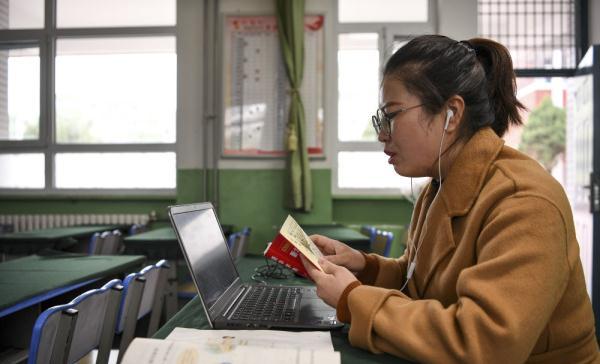Yinchuan, 27 Oct (Xinhua) -- With textbooks and dictionaries in hand, Zhang Haiyan sat in an empty classroom, facing the carefully prepared courseware on the computer, explaining how to use the first word search method to check new words, stopping from time to time to let students watching online look up the dictionary.

On October 25, Zhang Haiyan, a teacher at the Fourth Primary School in Xingqing District, Yinchuan City, Ningxia, gave Chinese lessons to third-grade students through the online platform. Photo by Xinhua News Agency reporter Feng Kaihua
"Which classmate found the word 'cabinet' in the 'attic' on which page?" Please answer. Answers quickly appeared on the screen, and some students answered incorrectly, and Zhang Haiyan patiently corrected them.
Affected by the new round of covid-19, some parts of China's Beijing, Inner Mongolia, Gansu, Ningxia and other places have activated emergency response mechanisms and are taking measures such as sealing and control, including suspending offline teaching and training activities in primary and secondary schools (kindergartens) and off-campus training institutions, switching to online teaching, and making every effort to reduce the risk of epidemic transmission.
Zhang Haiyan is a Chinese teacher at the No. 4 Primary School in Xingqing District, Yinchuan, Ningxia. As of the 26th, Ningxia has reported 20 confirmed cases of new crown pneumonia, and the six counties (districts and cities) where the epidemic occurred have suspended offline teaching and started online teaching.
On October 25, Huang Jianrong, a teacher at the Fourth Primary School in Xingqing District, Yinchuan City, Ningxia, gave Chinese lessons to second-grade students through the online platform. Photo by Xinhua News Agency reporter Feng Kaihua
Last year's months of online teaching, as well as normalized epidemic prevention and control requirements, have accumulated a lot of experience for education departments across China to respond to the epidemic and smoothly switch between online and offline teaching.
The Ningxia education department has formed a mature response mechanism to ensure that students "stop classes and do not stop learning" while continuously improving the quality of online teaching.
According to He Anning, director of the Teacher Development Center of the Education Bureau of Xingqing District, Yinchuan City, when the SARS epidemic was raging in 2003, students could only watch the national unified recorded courses through television sets; last year, with the development of China's "Internet + education", students in remote mountainous areas could watch more abundant online course resources with the help of mobile phones, computers and other equipment, and complete after-school exercises under the online guidance of the teachers in the class.
This year, based on the curriculum resources recorded by the national and local outstanding teachers in Ningxia last year, teachers in each school can independently choose the live broadcast platform, combined with high-quality curriculum resources and the actual teaching situation of the class, to provide targeted real-time teaching for students.
On October 25, An Siwen (right), a fifth-grade student in Yinchuan City, Ningxia, studied an online course accompanied by her mother. Photo by Xinhua News Agency reporter Feng Kaihua
"Before, it was easy to lose my mind by watching TV, but now when I listen to my teacher's lectures, I may also be randomly checked by homework, and I am more focused and learn better." An Siwen, a fifth-grade student at the Fourth Primary School in Xingqing District, said. The reporter went to An Siwen's home to interview and saw that even at home, she was wearing a school uniform and wearing a red scarf, singing the national anthem at the online flag-raising ceremony. On her desk, there are paintings completed in art class.
He Cuiling, principal of the Fourth Primary School in Xingqing District, told reporters that the school responded very calmly, not only issuing mobile phone holders for live broadcasting to all teachers, but also borrowing tablets to some families with insufficient listening equipment. In addition, the live broadcast platform used by the school this year has also been upgraded, which can monitor the live teaching of all classes in the school and evaluate and feedback on the teaching.
The level of online teaching by teachers has also increased significantly. When she first taught online last year, Zhang Haiyan was very nervous and worried that she would not be able to speak well. Today, although she is facing a computer, her eyes seem to be full of students. Some older teachers have also gradually adapted to the online teaching model.
On October 25, Yang Xueqin, a teacher at the Fourth Primary School in Xingqing District, Yinchuan City, Ningxia, learned about student interaction between online teaching. Photo by Xinhua News Agency reporter Feng Kaihua
In the exploration and practice, teachers have also explored the most suitable teaching methods for their students. In another classroom of the Xingqing District No. 4 Primary School, mathematics teacher Yang Xueqin is standing on a podium, facing the mobile phone set up in front of him to conduct live teaching, and using an electronic whiteboard to demonstrate the use of protractors to students. Ye Tongzheng, an art teacher, combined with the courseware "Paintings in Poems, Poems in Paintings" recorded by outstanding teachers in Beijing, taught students how to paint according to the imagery in ancient poems, and left homework after class.
Online teaching requires a high degree of self-discipline from students. Last year, teachers couldn't monitor whether students were watching online lessons. This year, with the help of the live broadcast platform, teachers can see the number of students online and their names. "If a student doesn't attend a lesson or doesn't complete homework well, we contact parents to urge their children." Zhang Haiyan said.
However, educators also believe that online teaching lacks interactivity, and can only be used as a supplementary form of offline teaching, and the main front of education is still in schools.
"I still hope that the epidemic will end quickly, go back to school, and study with my classmates." An Siwen said.
Source: Xinhua News Agency